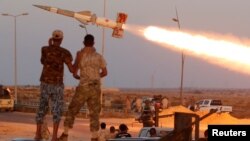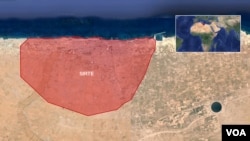Increased U.S. airstrikes in Libya could be the start of an effort to smother the Islamic State terror group as it tries to cling to a key North African stronghold.
U.S. Africa Command announced eight new strikes Tuesday against IS positions in Sirte, a key coastal city that has served as a base for the terror group’s operations.
The U.S. has now carried out a total of 28 airstrikes against IS as part of Operation Odyssey Lightning, which began August 1 following a request from Libya’s Government of National Accord (GNA).
A U.S. official, speaking on condition of anonymity, told VOA that U.S. special forces are also in the area “doing some coordination,” though the official was unable to elaborate.
USAFRICOM spokesperson Robyn Mack said the U.S. effort is "limited to strikes and information sharing to support those strikes" at the request of the GNA.
"As we have said, U.S. personnel have periodically gone in and out of Libya to exchange information to strengthen the fight against ISIL in Libya and that will intensify under this new approach," Mack said.
Forces loyal to the GNA had been making solid progress against IS fighters, pushing them back into the center of Sirte before the advance started to encounter heavy resistance and began to stall.
But aside from the U.S. airstrikes, it remains unclear how much more help will be coming.
Waiting for GNA
The U.S., Britain and France have all had special forces on the ground in Libya in preparation for increased cooperation. But each country, as well as Italy, has pinned any additional help to specific requests from the new Libyan government.
“We are keen to support the new Libyan government,” a British official told VOA. “So far they have made no such request."
The official also said British diplomats have been meeting more regularly with counterparts in the GNA in recent weeks. Still, there are no plans for British planes to join in the anti-IS airstrikes.
Another Western diplomatic official also acknowledged mixed signals from the GNA.
“They are keen on having our support,” the official said, adding the new Libyan government also wanted to make sure any help – even shared intelligence – would be “low key” in order to avoid any public backlash.
French special forces
Late last month, the death of three French special forces in a helicopter crash set off a series of Islamist-backed protests across Libya, prompting the GNA to summon the French ambassador.
Libyan officials may also have been emboldened by the initial success of the forces loyal to the GNA, which has cut the number of IS fighters in Libya from an estimated 6,000 to just 1,000, including several hundred still holed-up in Sirte.
Yet, there have been persistent concerns from U.S. and Western officials that Libya’s new government will need help to eradicate the IS threat, and fears that a reticence to ask for that help could prove costly.
“The Islamic State is definitely receding but it is far from over,” the Western diplomatic official told VOA.
“Daesh has surprised us before in its ability to move people,” the official said, using the Arabic name for the terror group. “There’s definitely a possibility that they see the fight is lost in Sirte and they’ve gone somewhere else."





